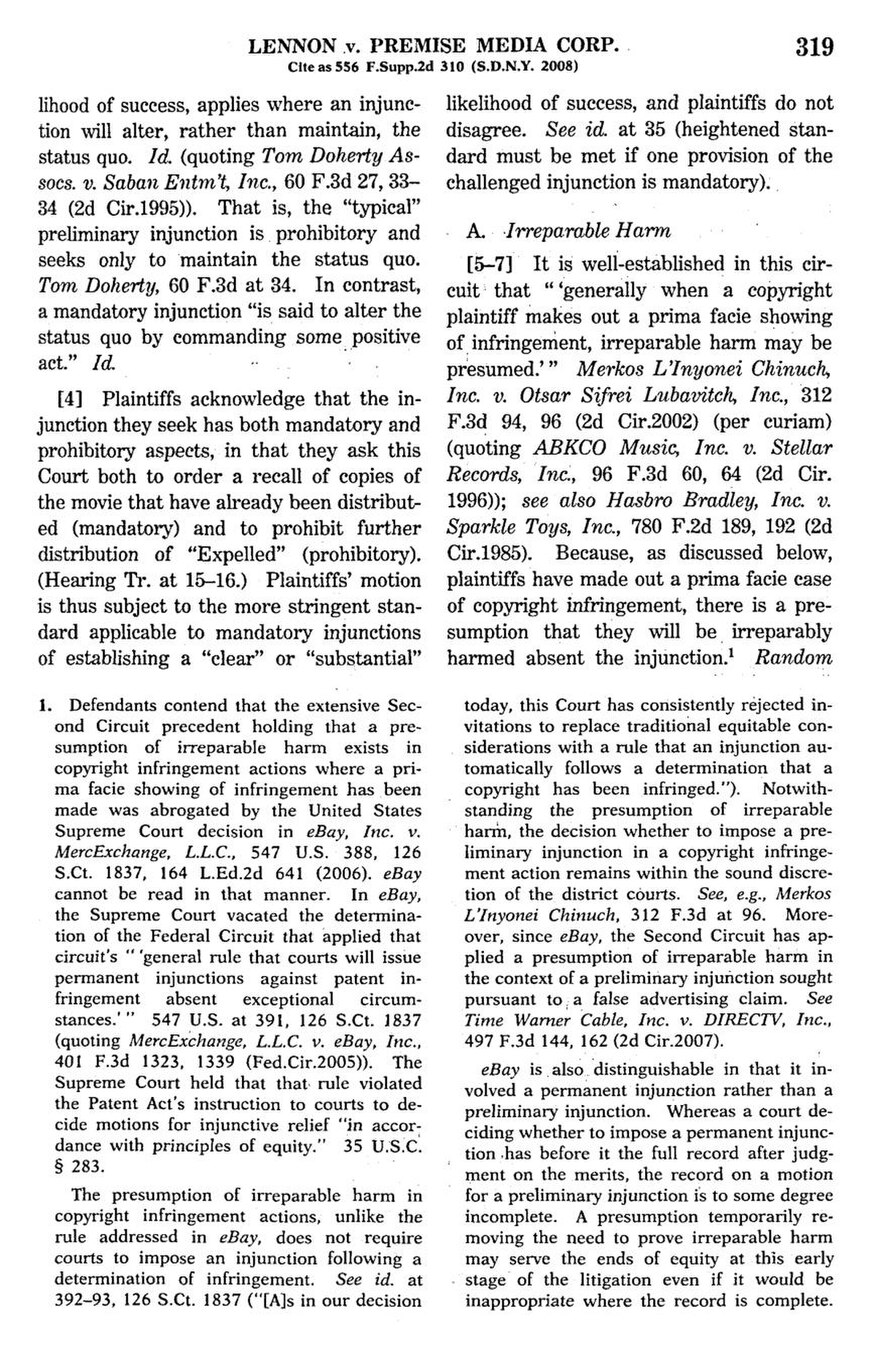Cite as 556 F.Supp.2d 310 (S.D.N.Y. 2008)
lihood of success, applies where an injunction will alter, rather than maintain, the status quo. Id. (quoting Tom Doherty Assocs. v. Saban Entm’t, Inc., 60 F.3d 27, 33-34 (2d Cir.1995)). That is, the “typical” preliminary injunction is prohibitory and seeks only to maintain the status quo. Tom Doherty, 60 F.3d at 34. In contrast, a mandatory injunction “is said to alter the status quo by commanding some positive act.” Id.
Plaintiffs acknowledge that the injunction they seek has both mandatory and prohibitory aspects, in that they ask this Court both to order a recall of copies of the movie that have already been distributed (mandatory) and to prohibit further distribution of “Expelled” (prohibitory). (Hearing Tr. at 15-16.) Plaintiffs’ motion is thus subject to the more stringent standard applicable to mandatory injunctions of establishing a “clear” or “substantial” likelihood of success, and plaintiffs do not disagree. See id. at 35 (heightened standard must be met if one provision of the challenged injunction is mandatory).
A. Irreparable Harm
It is well-established in this circuit that “‘generally when a copyright plaintiff makes out a prima facie showing of infringement, irreparable harm may be presumed.’” Merkos L’Inyonei Chinuch, Inc. v. Otsar Sifrei Lubavitch, Inc., 312 F.3d 94, 96 (2d Cir.2002) (per curiam) (quoting ABKCO Music, Inc. v. Stellar Records, Inc., 96 F.3d 60, 64 (2d Cir.1996)); see also Hasbro Bradley, Inc. v. Sparkle Toys, Inc., 780 F.2d 189, 192 (2d Cir.1985). Because, as discussed below, plaintiffs have made out a prima facie case of copyright infringement, there is a presumption that they will be irreparably harmed absent the injunction.[1] Random
- ↑ Defendants contend that the extensive Second Circuit precedent holding that a presumption of irreparable harm exists in copyright infringement actions where a prima facie showing of infringement has been made was abrogated by the United States Supreme Court decision in eBay, Inc. v. Mercexchange, L.L.C., 547 U.S. 388, 126 S.Ct. 1837, 164 L.Ed.2d 641 (2007). eBay cannot be read in that manner. In eBay, the Supreme Court vacated the determination of the Federal Circuit that applied that circuit’s “‘general rule that courts will issue permanent injunctions against patent infringement absent exceptional circumstances.’” 547 U.S. at 391, 126 S.Ct. 1837 (quoting MercExchange, L.L.C. v. eBay, Inc., 401 F.3d 1323, 1339 (Fed.Cir.2005)). The Supreme Court held that that rule violated the Patent Act’s instruction to courts to decide motions for injunctive relief “in accordance with principles of equity.” 35 U.S.C. § 283.
The presumption of irreparable harm in copyright infringement actions, unlike the rule addressed in eBay, does not require courts to impose an injunction following a determination of infringement. See id. at 392-93, 126 S.Ct. 1837 (“[A]s in our decision today, this Court has consistently rejected invitations to replace traditional equitable considerations with a rule that an injunction automatically follows a determination that a copyright has been infringed.”). Notwithstanding the presumption of irreparable harm, the decision whether to impose a preliminary injunction in a copyright infringement action remains within the sound discretion of the district courts. See, e.g., Merkos L’Inyonei Chinuch, 312 F.3d at 96. Moreover, since eBay, the Second Circuit has applied a presumption of irreparable harm in the context of a preliminary injunction sought pursuant to a false advertising claim. See Time Warner Cable, Inc. v. DIRECTV, Inc., 497 F.3d 144, 162 (2d Cir.2007).
eBay is also distinguishable in that it involved a permanent injunction rather than a preliminary injunction. Whereas a court deciding whether to impose a permanent injunction has before it the full record after judgment on the merits, the record on a motion for a preliminary injunction is to some degree incomplete. A presumption temporarily removing the need to prove irreparable harm may serve the ends of equity at this early stage of the litigation even if it would be inappropriate where the record is complete.
